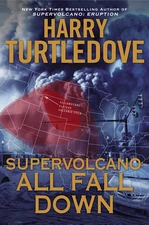Siberian Express is a shorthand meteorological term in the United States describing the arrival of an extremely cold air mass of Arctic origins. It does not necessarily refer to an origin in Siberia. The term is most commonly employed by the news media when such a frigid air mass moves into areas where it is relatively unusual, such as the Deep South or Eastern Seaboard of the United States. Meteorologically, it is typically associated with a phenomenon called the Pacific-North American teleconnection pattern (PNA).
Siberian Express in Supervolcano[]
Several years after the Yellowstone Supervolcano erupted, the weather in the United States and Canada continued to be much colder than before especially when a Siberian Express would hit. Bryce Miller was watching the Weather Channel when it warned of one such massive cold front approaching Wayne. It had already "severely impacted" Canada with Edmonton hitting a low of -68, Saskatoon a high of -31 and Winnipeg a low of -56.[1]
Because of the size of the storm, Wayne State cancelled all classes for the next two days. Bryce and Susan Ruppelt covered their apartment's double-paned windows with shades, venetian blinds and thick curtains. They blocked the crack under the door. But the cold seeped through the insulated walls. In desperation, they covered their bed with all the blankets they had and crept under fully clothed.[2]
The two survived the storm after it blew through and continued south to hit St. Louis, Memphis and New Orleans none of which were built for such a blizzard.[3]
References[]
- ↑ Things Fall Apart, pg. 199, HC.
- ↑ Ibid, pgs. 200-202.
- ↑ Ibid, pg. 203.
| |||||||||||||


